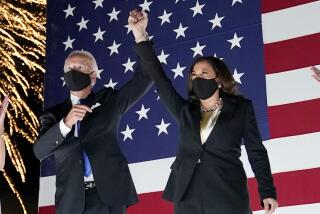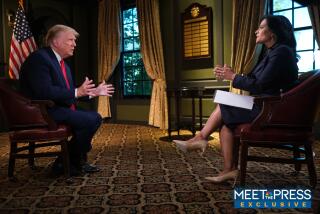Wolves and Sheep on the Campaign Trail
- Share via
Just after the speech ends, just after Bill Clinton’s “thang-kyew, thang-kyews” fade from the air, the game begins:
The reporters lean down from the camera platform or lean over the ropes that are patrolled by the Secret Service and begin to shout.
“Governor?” they shout. “Uh, Governor? The debates? Howya feel about the debates? Uh, Governor?”
And, if he so chooses, Bill Clinton will amble over and speak.
“I accepted the debate,” he said to reporters the other day as their boom mikes waved over him like brontosauruses looking for a tasty branch to munch upon. “He turned it down; I’ve accepted. I’m ready any time. It’s really a shame that, for whatever reason, they are running away.”
But, sometimes, Bill Clinton chooses not to speak.
“Uh, Governor?” the reporters will shout. “About the draft? About your uncle? Howya feel about . . .”
And Bill Clinton’s eyes will take on this dreamy look. And he will find something of extreme interest way off on the horizon. And he will stare straight through the reporters to get a better look at it. And then he will amble off to the friendly confines of his waiting limousine.
It does not have to be this way. Bill Clinton could hold press conferences where questions could be asked in an atmosphere of calm and quiet.
But, except on rare occasions, he does not wish to do this.
Take a close look the next time the networks do a recap of Bill Clinton’s statements on the Vietnam draft. Scene after scene is the same:
Clinton surrounded by a wolf pack of reporters. The reporters are shouting questions. Holding up recorders. Nearly knocking him over.
This behavior is by design. Bill Clinton’s design. His campaign wants it this way.
Firstly, such behavior makes the press look rude and builds sympathy for the candidate.
Secondly, such “group gropes” make it far easier for Clinton later to revise what he has said. After he made two conflicting statements on the draft on two consecutive days recently, Clinton was able to say with a straight face: “I gave a lot of my answers off the top of my head when they hit me with questions.”
And thirdly, by avoiding press conferences, Clinton can avoid situations where reporters get to ask follow-up question after follow-up question. You can walk away from boom microphones. You can walk away from a press wolf pack. But it never looks good to walk away from a press conference.
Ask Gary Hart. In 1988, he held a press conference to “clear the air” about his rumored infidelities. But question after question pinned him to the wall like a butterfly being mounted on cardboard. And, in the end, Hart basically fled the room.
But if Bill Clinton is good at anything, he is good at learning from the mistakes of others. Enter Michael Dukakis.
Michael Dukakis liked press conferences as the 1988 campaign began. He liked the give and take; he liked to show off his knowledge. George Bush did not like press conferences. And so Dukakis had many press conferences and Bush had few.
An interesting phenomenon resulted: The candidate who stiffed the press got what he wanted. The candidate who gave access to the press often got beat up for his trouble.
Because reporters could only shout questions at George Bush--one reporter actually started carrying a bullhorn--they got answers only to the questions he wanted to answer. And so reporters largely were forced to use what Bush said in his speeches for their stories.
But reporters were under no such constraints with Michael Dukakis. He would give a speech--on the environment, for instance--but then he would hold a press conference to find that reporters wanted to ask him about Willie Horton.
The Willie Horton quotes would make the news and the environment quotes would not.
Dukakis eventually learned. And by the end of the race, neither candidate was holding any press conferences.
So Bill Clinton is going to avoid press conferences as much as he can from the very beginning.
And he knows the press will have to play along because the press always does.
So the next time you see wolf packs surrounding candidates on TV, ask yourself this:
Just who really are the wolves? And who really are the sheep?
More to Read
Get the L.A. Times Politics newsletter
Deeply reported insights into legislation, politics and policy from Sacramento, Washington and beyond. In your inbox twice per week.
You may occasionally receive promotional content from the Los Angeles Times.










